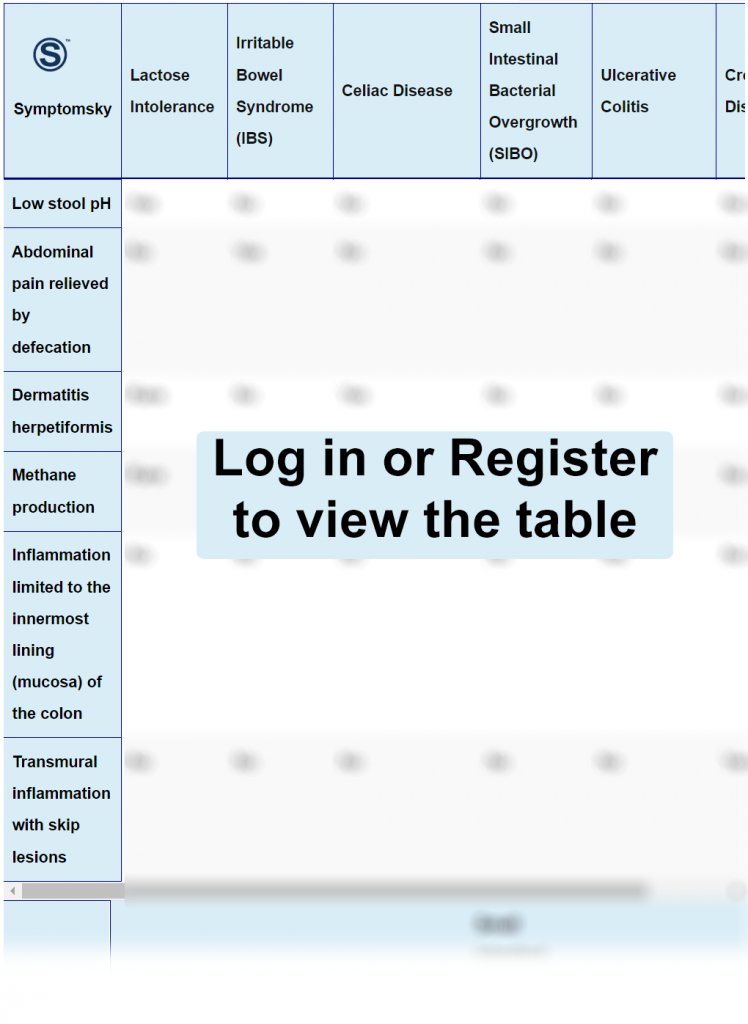Contents
- 1 Diarrhea Differential Diagnosis Table:
- 2 How To Recognize Which Disease Is Causing Diarrhea
- 2.1 How to Recognize if Lactose Intolerance is Causing Diarrhea
- 2.2 How to Recognize if Irritable Bowel Syndrome (IBS) is Causing Diarrhea
- 2.3 How to Recognize if Celiac Disease is Causing Diarrhea
- 2.4 How to Recognize if Small Intestine Bacterial Overgrowth (SIBO) is Causing Diarrhea
- 2.5 How to Recognize if Ulcerative Colitis is Causing Diarrhea
- 2.6 How to Recognize if Crohn’s Disease is Causing Diarrhea
- 3 Common Red Flags With Diarrhea
Diarrhea Differential Diagnosis Table:

Diarrhea is defined as an increase in the frequency of bowel movements to more than three times a day accompanied by a decrease in the consistency of the stools, and it may be accompanied by blood, mucus, undigested food, etc. It is considered acute when it has less than two weeks of evolution and chronic if it has more than four weeks of evolution.
There are several causes of diarrhea, but the major percentage is infectious. Among the non-infectious causes are drugs, food poisoning, viruses, inflammatory bowel diseases, etc. In addition to an increase in the number of stools and a decrease in stool consistency, the most common symptoms are abdominal pain, fever, nausea, vomiting, and food intolerance.
It is important to distinguish between acute and chronic diarrhea since acute diarrhea only requires support measures and does not require specific treatment except in certain cases, but chronic diarrhea, in addition to these general measures, requires treatment of the underlying cause since most chronic diarrhea is associated with various disorders such as irritable bowel syndrome, inflammatory diseases, or malabsorption syndromes.
In order to know the origin of the diarrhea, it is necessary to obtain a good clinical history and the support of laboratory tests such as coprology to identify the responsible agent. The treatment will depend on the cause and severity of the diarrhea. If it is mild, general support measures such as the administration of fluids on an outpatient basis are given. In some cases of moderate dehydration, the administration of intravenous fluids is mandatory. The use of antibiotics is not always necessary, but in some cases, they are required.
How To Recognize Which Disease Is Causing Diarrhea
How to Recognize if Lactose Intolerance is Causing Diarrhea
Lactose intolerance is a condition in which the body cannot digest lactose, which is found in milk and dairy products. Diarrhea in this condition is chronic, and it is characteristic that it begins half an hour to two hours after eating or drinking dairy products. Patients present abdominal pain, loose stool, flatulence, vomiting, and nausea.
How to Recognize if Irritable Bowel Syndrome (IBS) is Causing Diarrhea
To diagnose this condition, certain criteria must be present for three months and the presence of these criteria six months before or prior to the diagnosis. There must be the presence of abdominal pain once a week in the last three months, which is relieved after defecation accompanied by diarrhea or stool changes. Diarrhea is bloody or may have rectal bleeding, fever, recurrent nausea or vomiting. Abdominal pain may disrupt sleep.
How to Recognize if Celiac Disease is Causing Diarrhea
Celiac disease is considered a systemic or immune-mediated disease with predisposing genetic factors. It is a bulky, greasy, foul-smelling chronic diarrhea accompanied by abdominal pain and bloating, flatulence, nausea, vomiting, weight loss, and vitamin deficits.
How to Recognize if Small Intestine Bacterial Overgrowth (SIBO) is Causing Diarrhea
This syndrome is characterized by the abnormal and excessive presence of bacteria in the small intestine that are normally found in the large intestine. This condition causes diarrhea, fatigue, constipation, abdominal distension, dyspepsia, flatulence, and abdominal pain. The most characteristic symptom is abdominal distension.
How to Recognize if Ulcerative Colitis is Causing Diarrhea
Ulcerative colitis is a chronic inflammatory pathology characterized by progressive diarrhea accompanied by rectorrhagia. Some patients may present incontinence and urgency to defecate. Anorexia may be present. Diarrhea is mucous and bloody. In some cases, there are extraintestinal manifestations such as oral ulcers and joint pain.
How to Recognize if Crohn’s Disease is Causing Diarrhea
Crohn’s disease is an autoimmune chronic inflammatory condition that can affect any part of the digestive system, so its manifestations are very variable because of its location. Patients with involvement of the small intestine will present mainly abdominal pain, diarrhea, weakness, weight loss, and lack of appetite. In patients where the colon is affected, diarrhea sometimes may be bloody.
Common Red Flags With Diarrhea
Diarrhea is treated by restoring lost fluids, salts, and minerals through oral or intravenous hydration.
In case of signs of dehydration or chronic diarrhea, severe abdominal pain or rectum, blood or black color in the stool, a visit to your primary care physician is required. There are preventable diarrheas such as rotavirus diarrhea in pediatric patients through vaccination and traveler’s diarrhea in adults through precautionary measures.
